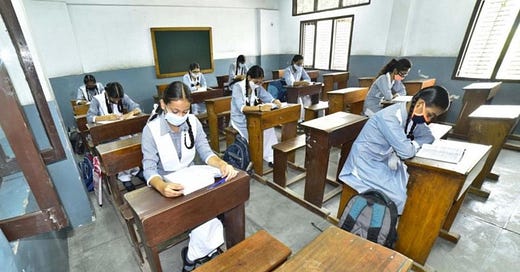Punjabi in Punjab schools: Rhetoric versus reality
The recent decision of the Central Board of Secondary Education (CBSE) to relegate Punjabi to the status of a minor subject, from its…
The recent decision of the Central Board of Secondary Education (CBSE) to relegate Punjabi to the status of a minor subject, from its previous status of a major subject, has triggered a controversy on what is potentially an emotive issue.
Punjab chief minister Charanjit Singh Channi and two of his cabinet ministers, including education minister Pargat Singh, have unequivocally condemned this decision as a manifestation of the central government’s general policy to encroach upon the constitutional space of the states, in what is supposed to be a federal polity. While the CBSE has been at pains to explain that this is merely an administrative decision, based on the number of students opting for a particular language/subject, eminent citizens, including educationists, former administrators and even NRIs, have expressed an opinion that this decision, whether by accident or by design, shall further whittle down the importance of Punjabi in the country, particularly in Punjab.
Medium of instruction
In this context, many of the participants in this lively debate have missed out on the provisions of the Punjab Learning of Punjabi and Other Languages Act, 2008. This enactment, which was approved unanimously by the Punjab Vidhan Sabha during the tenure of the Parkash Singh Badal Government, in which the BJP was an active ally, makes teaching of Punjabi compulsory in all schools in the state from Classes 1 to 10. This law makes it mandatory for all schools to teach Hindi from Classes 3 to 8. The enactment makes it clear that there shall be no bar in teaching English in the school, notwithstanding the provisions pertaining to Punjabi and Hindi. The Act is, however, silent on the medium of instruction.
Legal experts, including education administrators, have rushed to point out that education being a concurrent list subject, a Punjab law cannot operate to impose its will on the CBSE, a statutory body of the central government. It is, however, submitted that this law does not prima facie offend provisions of any central law.
The definition of school, under this 2008 law, is wide enough to include schools run by societies and trusts. It thus applies equally to schools affiliated with CBSE/ICSE Boards, since all of them are required to have a non-proprietary legal structure, such as a society/trust.
Contentious section
Nevertheless, Section 3 (2) is slightly contentious. It states: “No board or institution shall award matriculation certificate to any student, unless he has passed the Tenth Class examination in Punjabi subject.”
Does this effectively mean that the CBSE shall not be able to issue a matriculation certificate, in respect of students of schools situated in Punjab, unless they have Punjabi as one of the subjects at the Class 10 level? While the teaching of Punjabi has been made mandatory up to Class 10, the basic question arises is whether the students can opt for either Hindi or Punjabi as one of the languages, in addition to the compulsory English, in Classes 9 and 10. This is to be seen in the context that the regulation of the CBSE, statutory in nature, will evidently provide so.
In my opinion, Section 3(2) cannot be read to invalidate a matriculation certificate issued by the CBSE/ICSE, merely on the ground that Punjabi was not taken as one of the subjects in the Class 10 board exam. This is so because Section 3(2) would run counter to the statutory regulation of the CBSE and hence would effectively be inoperative, since the conflict of the Punjab law is essentially in conflict with a central law on education, a concurrent list subject.
A harmonious interpretation would mean that while teaching of Punjabi in all schools in Punjab, including those affiliated with CBSE/ICSE Boards, is mandatory up to Class 10, it is purely the choice of the student whether he/she opts for Punjabi or Hindi as an elective subject in Classes 9 and 10, or even both.
Section 7 of this Act allows the government to exempt a class or category of students, but not schools, from any of the provisions of this law. Thus, foreign nationals or children of defence personnel and other officers, who are liable to be transferred all over the country, may be exempted from learning Punjabi. The enactment also provides an increasing amount of civil penalty that can be imposed on the schools that are not complying with the law. It, however, stops short of criminal prosecution.
Ninth most widely spoken language
The promotion of Punjabi within and outside Punjab will require interventions much beyond merely a state legislation. NGOs, in particular organisations such as the Shiromani Gurdwara Parbandhak Committee (SGPC) and Chief Khalsa Diwan, must contribute their might and to encourage reading, writing and speaking of Punjabi. Punjabi University, Patiala, which was set up in 1961, essentially to promote Punjabi as a language will also need to refocus and reorient its priorities.
The mother tongue in general, and Punjabi in particular, is an emotive issue and even Punjabi-speaking population across the border has been increasingly vociferous, seeking reintroduction of this language, though in “shahmukhi” script, as an official language in West Punjab, instead of Urdu.
In a scenario where about 93 million people across the globe have Punjabi as their mother tongue, it being the ninth most widely spoken language, we as a nation cannot afford to allow Punjabi language to become a bone of contention in the border state of Punjab, which can easily snowball into something far more serious. Statesmanship, not politics, is required at this stage. kbs.sidhu@gmail.com
The writer is a retired Punjab-cadre IAS officer. Views expressed are personal
Originally published at https://www.hindustantimes.com on October 22, 2021.




